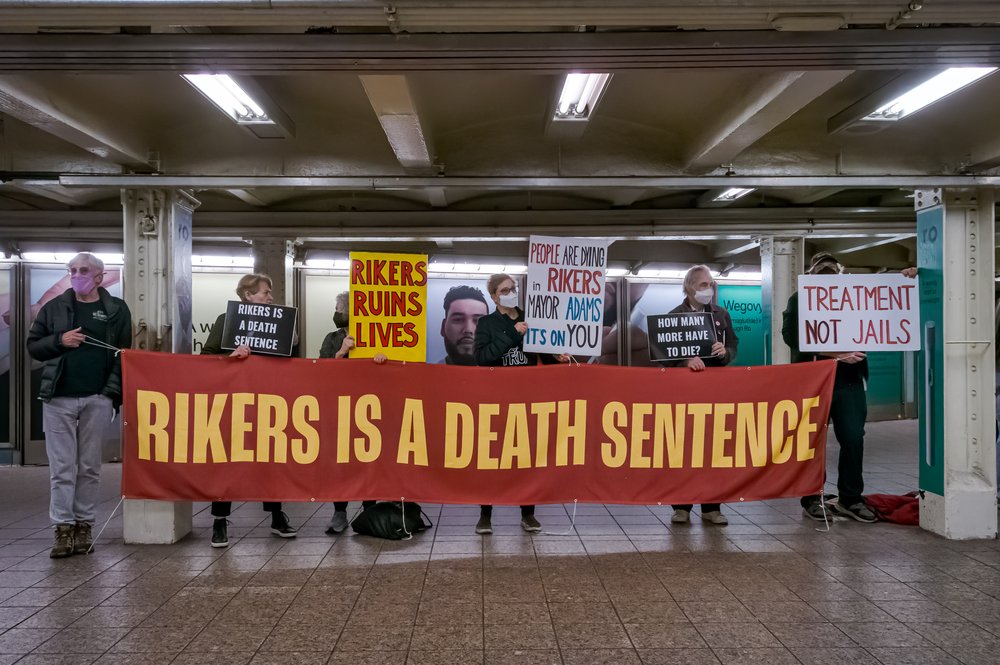NYC courts launch new plan to tackle case backlog ahead of Rikers Island closure
Oct. 11, 2024, 6 p.m.
Court officials know they need to speed things up to keep the prison population down ahead of the planned Rikers closure.

Officials with the state’s court system have announced a plan to speed up felony cases in New York City, which they say is necessary to cut down on the jail population ahead of the closure of Rikers Island.
The newly unveiled plan from Chief Administrative Judge Joseph Zayas focuses largely on trying to quickly snuff out issues over key pieces of evidence before a trial takes place, all in hopes of ensuring defendants don’t have to wait many months — or even years — for their day in court.
New York City's significant backlog of criminal and civil cases was exacerbated by the COVID-19 pandemic, which severely disrupted the court system.
But the state's Chief Judge Rowan Wilson said case backlogs have long been “endemic” to the court system, which he says is “inexcusable.” He’s backing the plan advanced by his appointees, and so are Mayor Eric Adams and City Council Speaker Adrienne Adams.
“Victims, defendants and the public deserve a criminal justice system that proceeds swiftly, intelligently and compassionately,” Wilson said in a statement.
The move comes as a court case seeks to wrest control of Rikers Island from the city and install a court-appointed third party to run the troubled jail complex. At least 19 detainees died in city jails in 2022. Mayor Adams has said the Department of Correction is capable of ensuring detainees’ safety at the jails.
Gothamist recently reported on correction officers who continue to serve at the jails despite being named in allegations of sexual abuse.
Prosecutors filed about 290,000 cases in New York City criminal court last year, according to the state court system’s annual report. The vast majority of those cases — more than 97%, according to Wilson — were resolved without a trial.
But those cases that do go to trial can languish in the system. Of the 16,234 people discharged from the city’s jail system last year, about 1,500 – or 9% — waited more than a year, according to a report by city Comptroller Brad Lander. Of those, 243 cases — often murder cases — took more than three years.
State court officials acknowledge that they have a part to play in reducing the jail population in anticipation of Rikers’ closing. The Rikers Island jails are legally mandated to close by 2027 and replaced with four jails throughout the boroughs, though two of those facilities have been delayed, raising questions about the overall timeline.
Among other things, the new plan calls for judges to issue a schedule at the beginning of a case that ensures key evidence is disclosed early on and that prosecution and defense attorneys adhere to deadlines.
The plan also calls for city judges to schedule regular conferences to iron out evidence disputes, rather than waiting until the days or weeks before a trial. The city courts, meanwhile, will have teams of attorneys dedicated to resolving issues in the late stages of the process, and a citywide calendar system officials hope will cut down on canceled hearings and conferences.
The strategy will first launch in Brooklyn this fall and focus on cases involving currently incarcerated people before expanding to the other boroughs, according to the Office of Court Administration.
Speaker Adams said the plan includes “welcome and necessary solutions” to reduce criminal case delays. But in a joint statement with Councilmember Sandy Nurse, who chairs the criminal justice committee, she called on Mayor Adams to “more seriously commit to working with all stakeholders to take the steps necessary to close Rikers.”
“Now is the time for committed action to end the public safety threat that Rikers continues to pose, improving conditions for staff and people detained in city jails alike, as well as safety in our communities,” Speaker Adams and Nurse said in their statement.
Adams has cast doubt on meeting the deadline to close Rikers, citing the cost of building new borough-based jails.
In his own statement, Mayor Adams praised the court system’s plan, calling it a “smart and effective” approach that will “allow our criminal justice system to clear the backlog of cases and more efficiently serve New Yorkers.”
He was Officer 'Champagne' at Rikers. 24 women accuse him of sexual assault in jail.